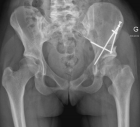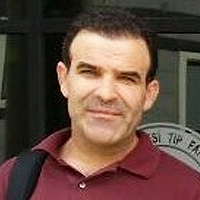Abstract
Case Presentation
Jaw Subluxation as a Complication of Tardive Dyskinesia
Diana Paleacu Kertesz*
Published: 15 November, 2024 | Volume 8 - Issue 3 | Pages: 131-133
Tardive Dyskinesia (TD) is an iatrogenic complication caused by antipsychotic agents and rarely by other anti-depressive/antiepileptic or anti-nausea medication. It is mostly a benign condition with implications regarding esthetic issues but it can also impact social and emotional well-being. We are reporting a case in which severe TD ensued in an elderly lady with newly diagnosed dementia, who presented to the psychiatric ER with a Capgras syndrome and paranoia accompanied by behavioral disturbances. She was treated with 4 consecutive antipsychotic agents (haloperidol, brexiprazole, risperidone, and olanzapine) due to unresponsive psychosis in conjunction with biperiden and developed a severe case of TD, which was complicated by two successive episodes of jaw subluxation. In spite of the good outcome following the reduction of the subluxation, we emphasize the danger of this rare painful, and bothersome side-effect and recommend how to pharmacologically deal with the TD setting in which it occurred.
Read Full Article HTML DOI: 10.29328/journal.acr.1001112 Cite this Article Read Full Article PDF
Keywords:
Tardive dyskinesia; Antipsychotics; Jaw subluxation
References
- Frei K, Truong DD, Fahn S, Jankovic J, Hauser RA. The nosology of tardive syndromes. J Neurol Sci. 2018;389:10-16. Available from: https://doi.org/10.1016/j.jns.2018.02.008
- Diagnostic and Statistical Manual of Mental Disorders. Fifth Edition. DSM-5. Available from: https://seragpsych.com/wordpress/wp-content/uploads/2019/02/DSM5Update_October2018.pdf
- Correll CU, Kane JM, Citrome LL. Epidemiology, Prevention, and Assessment of Tardive Dyskinesia and Advances in Treatment. J Clin Psychiatry. 2017;78(8):1136-1147. Available from: https://doi.org/10.4088/jcp.tv17016ah4c
- Frei K. Tardive dyskinesia: Who gets it and why. Park Relat Disord. 2019;59(August 2018):151-154. Available from: https://doi.org/10.1016/j.parkreldis.2018.11.017
- Kane JM. Tardive dyskinesia in affective disorders. J Clin Psychiatry. 1999;60 Suppl 5:43-7; discussion 48-9. Available from: https://pubmed.ncbi.nlm.nih.gov/10192407/
- Solmi M, Pigato G, Kane JM, Correll CU. Clinical risk factors for the development of tardive dyskinesia. J Neurol Sci. 2018;389(January):21-27. Available from: https://doi.org/10.1016/j.jns.2018.02.012
- Wilcox PG, Bassett A, Jones B, Fleetham JA. Respiratory dysrhythmias in patients with tardive dyskinesia. Chest. 1994 Jan;105(1):203-7. Available from: https://doi.org/10.1378/chest.105.1.203
- Ondo WG, Hanna PA, Jankovic J. Tetrabenazine treatment for tardive dyskinesia: Assessment by randomized videotape protocol. Am J Psychiatry. 1999;156(8):1279-1281. Available from: https://doi.org/10.1176/ajp.156.8.1279
- Fernandez HH, Factor SA, Hauser RA, Jimenez-Shahed J, Ondo WG, et al. Randomized controlled trial of deutetrabenazine for tardive dyskinesia: The ARM-TD study. Neurology. 2017;88(21):2003-2010. Available from: https://doi.org/10.1212/wnl.0000000000003960
- Hauser RA, Factor SA, Marder SR, Knesevich MA, Ramirez PM, Jimenez R, et al. KINECT 3: A phase 3 randomized, double-blind, placebo-controlled trial of valbenazine for tardive dyskinesia. Am J Psychiatry. 2017;174(5):476-484. Available from: https://doi.org/10.1176/appi.ajp.2017.16091037
- Capgras J, Reboul-Lachaux J. Illusion of “lookalikes” in chronic systematized delirium. Bull Soc Clin Med Mental. 1923;2:6–16. Available from: https://www.psychologyconcepts.com/wp-content/uploads/2017/05/Illusion-des-sosies-dans-un-delire-systematise-chronique-Psychology-Concepts.pdf
- Kozian R, Kiszka T, Peter K, Kühne GE. Acute dyskinesia as the cause of jaw dislocation. Psychiatr Prax. 1992 Jul;19(4):119-21. Available from: https://pubmed.ncbi.nlm.nih.gov/1354880/
- Hashimoto T, Naito K, Kitazawa K, Imai S, Goto T. Pallidotomy for severe tardive jaw-opening dystonia. Stereotact Funct Neurosurg. 2010;88(2):105-8. Available from: https://doi.org/10.1159/000280822
- Kohara K, Taira T, Horisawa S, Hanada T, Kawamata T. Bilateral Pallidotomy for Tardive Dystonia: A Case Report. No Shinkei Geka. 2017;45(11):971-976. Available from: https://doi.org/10.11477/mf.1436203631
Figures:
Similar Articles
-
Refractory priapism associated with anti-psychotics. Report of a case for risperidoneRamos Luces Odionnys*, Fermín Miriangel and Perdomo Yalisca. Refractory priapism associated with anti-psychotics. Report of a case for risperidone. . 2023 doi: 10.29328/journal.acr.1001070; 7: 020-022
-
Jaw Subluxation as a Complication of Tardive DyskinesiaDiana Paleacu Kertesz*. Jaw Subluxation as a Complication of Tardive Dyskinesia. . 2024 doi: 10.29328/journal.acr.1001112; 8: 131-133
Recently Viewed
-
Community, health and rehabilitationAlessandro Giustini*. Community, health and rehabilitation. J Community Med Health Solut. 2023: doi: 10.29328/journal.jcmhs.1001025; 4: 001-003
-
Case Report: Intussusception in an Infant with Respiratory Syncytial Virus (RSV) Infection and Post-Operative Wound DehiscenceLamin Makalo*,Orlianys Ruiz Perez,Benjamin Martin,Cherno S Jallow,Momodou Lamin Jobarteh,Alagie Baldeh,Abdul Malik Fye,Fatoumatta Jitteh,Isatou Bah. Case Report: Intussusception in an Infant with Respiratory Syncytial Virus (RSV) Infection and Post-Operative Wound Dehiscence. J Community Med Health Solut. 2025: doi: 10.29328/journal.jcmhs.1001051; 6: 001-004
-
Requirement for object-oriented database management systems in forensic scienceGesine Rempp A,Volkmar Vill*. Requirement for object-oriented database management systems in forensic science. J Forensic Sci Res. 2023: doi: 10.29328/journal.jfsr.1001042; 7: 001-003
-
Sinonasal Myxoma Extending into the Orbit in a 4-Year Old: A Case PresentationJulian A Purrinos*, Ramzi Younis. Sinonasal Myxoma Extending into the Orbit in a 4-Year Old: A Case Presentation. Arch Case Rep. 2024: doi: 10.29328/journal.acr.1001099; 8: 075-077
-
Pneumothorax as Complication of CT Guided Lung Biopsy: Frequency, Severity and Assessment of Risk FactorsGaurav Raj*,Neha Kumari,Neha Singh,Kaustubh Gupta,Anurag Gupta,Pradyuman Singh,Hemant Gupta. Pneumothorax as Complication of CT Guided Lung Biopsy: Frequency, Severity and Assessment of Risk Factors. J Radiol Oncol. 2025: doi: 10.29328/journal.jro.1001075; 9: 012-016
Most Viewed
-
Evaluation of Biostimulants Based on Recovered Protein Hydrolysates from Animal By-products as Plant Growth EnhancersH Pérez-Aguilar*, M Lacruz-Asaro, F Arán-Ais. Evaluation of Biostimulants Based on Recovered Protein Hydrolysates from Animal By-products as Plant Growth Enhancers. J Plant Sci Phytopathol. 2023 doi: 10.29328/journal.jpsp.1001104; 7: 042-047
-
Sinonasal Myxoma Extending into the Orbit in a 4-Year Old: A Case PresentationJulian A Purrinos*, Ramzi Younis. Sinonasal Myxoma Extending into the Orbit in a 4-Year Old: A Case Presentation. Arch Case Rep. 2024 doi: 10.29328/journal.acr.1001099; 8: 075-077
-
Feasibility study of magnetic sensing for detecting single-neuron action potentialsDenis Tonini,Kai Wu,Renata Saha,Jian-Ping Wang*. Feasibility study of magnetic sensing for detecting single-neuron action potentials. Ann Biomed Sci Eng. 2022 doi: 10.29328/journal.abse.1001018; 6: 019-029
-
Physical activity can change the physiological and psychological circumstances during COVID-19 pandemic: A narrative reviewKhashayar Maroufi*. Physical activity can change the physiological and psychological circumstances during COVID-19 pandemic: A narrative review. J Sports Med Ther. 2021 doi: 10.29328/journal.jsmt.1001051; 6: 001-007
-
Pediatric Dysgerminoma: Unveiling a Rare Ovarian TumorFaten Limaiem*, Khalil Saffar, Ahmed Halouani. Pediatric Dysgerminoma: Unveiling a Rare Ovarian Tumor. Arch Case Rep. 2024 doi: 10.29328/journal.acr.1001087; 8: 010-013

HSPI: We're glad you're here. Please click "create a new Query" if you are a new visitor to our website and need further information from us.
If you are already a member of our network and need to keep track of any developments regarding a question you have already submitted, click "take me to my Query."
























































































































































